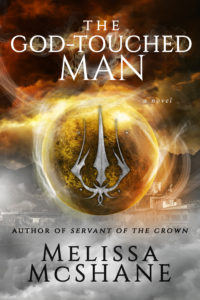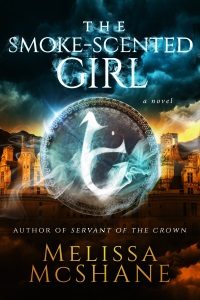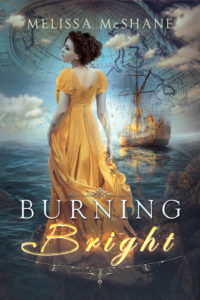A few months ago I published my second book, THE SMOKE-SCENTED GIRL, and immediately noticed something interesting: a number of reviewers seemed to think it was a young adult book. It was a little disconcerting. I wrote it as an adult novel, with adults who have adult concerns–I suppose it could be called New Adult, since the characters are all in their early 20s, but I tend to think of New Adult as applying to contemporary fiction.
So I stepped back and looked at the book from what I hoped was an impartial eye, and found some traits I think might make THE SMOKE-SCENTED GIRL look like YA fiction:
- There’s no sex or swearing. (I’m pretty sure about the latter. I tend to forget unless I’ve used really strong swears.)
- The prose is simple.
- The plot isn’t terribly complicated.
- Adult readers, based on the response, are comfortable giving it to their teenage children to read.
And this is where it does get complicated. I spent years reviewing and critiquing young adult fiction (a subject for another blog post) and YA fantasy has always been one of my favorite reads. So I’m the last person to be embarrassed about reading, or writing, YA fiction. On the other hand, because I’ve spent so many years in this genre, I also have a good idea of what’s being published in it and what sort of books qualify for the category. My book really, truly doesn’t. YA fiction is not actually defined as “books teens read.” Teens read, and have always read, adult books. They’re assigned adult books in their high school English classes. And I’m not sure anyone’s willing to call A TALE OF TWO CITIES a YA book. I’ll address the difference between “YA books” and “adult books teens happen to read” later.
But it’s that fourth bullet point I want to look at more closely now. One of the things I’ve noticed over the years is that many parents who want their children to read, who want to encourage them to read, are lost when it comes to choosing books for their kids. With good reason. They can’t afford to read everything they give their kids. And a lot of these parents are concerned about the content of their kids’ books. So they go looking for ways to pick from among the hundreds of thousands of choices, and one of those ways is to look for the “young adult” tag, however it appears–books in the YA section of the bookstore or library, frequently. Their belief is that YA titles must be acceptable because they aren’t adult novels, with the swearing and sex and violence they contain.
But many parents don’t realize one important fact: YA does not mean “safe.”
The key distinguishing feature between a young adult novel and an adult novel a teen chooses to read is simply that YA books describe the experience of being a teenager. And that experience is not always pretty. Teens these days live in a world of violence, in which profanity is common (visit your local high school if you don’t believe that) and sexual experiences are becoming the norm. Divorce, abuse, rape, mental illness–all serious subjects that many teens deal with on a personal basis. Kids can’t be spared knowing about these things even if they manage to stay aloof from them. And kids need ways to process these experiences. That’s one of the things books do–give us ways to understand the things life throws at us.
Here are a few of the YA books I’ve had to defend to very surprised parents:
THE MONSTRUMOLOGIST, Rick Yancey: Though this is a horror/fantasy novel, and the protagonist Will Henry’s experiences are in no way realistic, dealing as they do with cannibalistic monsters and rotting corpses, Will Henry’s growth as a character comes from discovering who he is when he’s thrown into an adult world that makes no allowances for childhood or innocence.
SAVING FRANCESCA, Melina Marchetta: Harsh swearing and casual references to sex, a no-no for a lot of parents, but this also deals with the serious issue of mental illness and how it can tear a family apart. Francesca’s problems extend well beyond her mother’s mental illness, but this is also about friendship and what it means to no longer be alone.
FIRE AND HEMLOCK, Diana Wynne Jones: Incredibly complicated plot and a semi-appropriate relationship between a teenage girl and an adult man, this is still one of the great works of YA fantasy almost 30 years after its publication. This one isn’t challenged so much for content as for the idea that it’s too hard for a teenager. I’m pretty sure that should be up to the teenager.
THE HUNGER GAMES, Suzanne Collins: No one argues with me that this is YA fiction; the argument I tend to get is that it shouldn’t be read by teens because of extreme violence and “disturbing” images (not that I know what this means). Again, this is a story about fighting an unfair world, and what teen can’t relate to that?
DEERSKIN, Robin McKinley: The rape and incest are the more disturbing for not being described in detail, but I’ve had parents complain because they were familiar with McKinley’s other books and didn’t expect to find this kind of content in a retelling of a fairy tale. Never mind that most fairy tales, in their original versions, are dark and disturbing and terrifying.
I’m opposed to censorship. I’m not opposed to parents trying to make good decisions about their children’s reading. I’m not at all offended by parents thinking THE SMOKE-SCENTED GIRL is a YA book–I’ve given it to my own kids. But choosing a book solely because it’s marketed as young adult and thinking it’s therefore “safe” isn’t the way to achieve that.
What about you? What YA books would you defend as appropriate for teenaged readers despite their content?
 Monday. I don’t actually dread Mondays. They’re like resetting the switch for the week, getting a fresh start. I like to start Monday with a new book, though this week it’s actually an old book called Ripley Under Water. I found the book The Talented Mr. Ripley in New Orleans and gradually became addicted to the rest of the series. Tom Ripley is not your typical sociopath–he’s a murderer, knows what he’s done is wrong, but resolves not to let those deaths destroy him. And since most of the people he kills are objectionable or even evil, it’s hard not to have sympathy for him. Highsmith’s writing is spare and economical where it needs to be and full of detail where that’s necessary. This is the last book in the series, and I’ll be sad to let it go.
Monday. I don’t actually dread Mondays. They’re like resetting the switch for the week, getting a fresh start. I like to start Monday with a new book, though this week it’s actually an old book called Ripley Under Water. I found the book The Talented Mr. Ripley in New Orleans and gradually became addicted to the rest of the series. Tom Ripley is not your typical sociopath–he’s a murderer, knows what he’s done is wrong, but resolves not to let those deaths destroy him. And since most of the people he kills are objectionable or even evil, it’s hard not to have sympathy for him. Highsmith’s writing is spare and economical where it needs to be and full of detail where that’s necessary. This is the last book in the series, and I’ll be sad to let it go. This Monday also marks the beginning of a week of sales for me. The God-Touched Man, sequel to The Smoke-Scented Girl, comes out on Tuesday. It features Piercy Faranter, man about town and secret agent, whose assignment to chaperone a foreign princess turns into a quest to solve a mystery with roots a thousand years deep. Piercy was a fun character to write, and I hope readers will enjoy reading about him.
This Monday also marks the beginning of a week of sales for me. The God-Touched Man, sequel to The Smoke-Scented Girl, comes out on Tuesday. It features Piercy Faranter, man about town and secret agent, whose assignment to chaperone a foreign princess turns into a quest to solve a mystery with roots a thousand years deep. Piercy was a fun character to write, and I hope readers will enjoy reading about him. In celebration of this release, I’m putting The Smoke-Scented Girl on sale for $0.99 all week. It’s not necessary to read it before The God-Touched Man, but if you haven’t, this is a great opportunity to pick it up for cheap. In The Smoke-Scented Girl, Piercy’s friend Evon is a magician tasked to solve the mystery of spontaneously occurring fires hotter than anyone can make. What he finds is a girl named Kerensa, a thousand-year-old curse, and the legend of four semi-mythical heroes, all of which may be the key to stopping a power-hungry warlord bent on conquering the world.
In celebration of this release, I’m putting The Smoke-Scented Girl on sale for $0.99 all week. It’s not necessary to read it before The God-Touched Man, but if you haven’t, this is a great opportunity to pick it up for cheap. In The Smoke-Scented Girl, Piercy’s friend Evon is a magician tasked to solve the mystery of spontaneously occurring fires hotter than anyone can make. What he finds is a girl named Kerensa, a thousand-year-old curse, and the legend of four semi-mythical heroes, all of which may be the key to stopping a power-hungry warlord bent on conquering the world. Sophia, the Extraordinary Seer who discovered how the pirates were tracking the Navy ships. Robbed of her professional reputation by the Viscount Lord Endicott, Sophia sets out to prove his criminal activities and redeem herself–but in her quest to destroy him, she finds herself becoming increasingly like him. Wondering Sight will be released on January 19, 2017.
Sophia, the Extraordinary Seer who discovered how the pirates were tracking the Navy ships. Robbed of her professional reputation by the Viscount Lord Endicott, Sophia sets out to prove his criminal activities and redeem herself–but in her quest to destroy him, she finds herself becoming increasingly like him. Wondering Sight will be released on January 19, 2017.